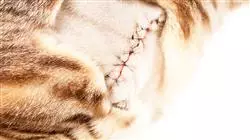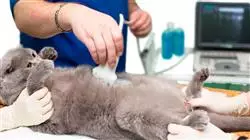University certificate
The world's largest faculty of veterinary medicine”
Description
Get up to date with the latest diagnostic techniques for the urinary tract, blood tests with a focus on nephrology and monitoring diabetes mellitus in cats"

Although, to a large extent, the feline pathologies that the veterinarian faces on a daily basis are relatively easy to treat, the continuous developments in the approach to complications of all kinds should never be ignored. Specifically, the areas of endocrinology, digestive system and feline urinary system have advanced considerably in recent years, offering tools and procedures that facilitate the veterinarian's daily work.
For this reason, TECH has brought together a team of experts in the approach to pathologies in these fields, in order to design a comprehensive and efficient academic program for all specialists. The professors have provided all the most current scientific and theoretical knowledge, complementing it with the necessary real clinical practice to give an even greater contextualization and usefulness to all the topics covered.
This postgraduate diploma covers the most important advances in digestive endoscopy, oral diseases, diabetes mellitus monitoring, adrenal gland disorders, urinalysis and techniques to address ureteral obstructions, among many other topics of great interest to any veterinarian who deals with feline patients on a regular basis.
Being aware of how difficult it can be to cover a wide area of knowledge in a context of increasing professional and personal responsibilities, TECH offers all the contents of this program completely online. This means that there are neither pre-set classes nor established schedules, being the veterinarians themselves the one who chooses how to distribute the entire teaching program. In this way, an ideal balance between academic, professional and personal facets is achieved.
Bring into your daily practice the most important advances of recent years, including treatments for hyperthyroidism, feline dentistry and surgical treatments for ureteral obstruction"
This postgraduate diploma in Endocrine, Digestive and Urinary System Pathology in Cats contains the most complete and up-to-date scientific program on the market. The most important features include:
- The development of case studies presented by experts in Feline Medicine and Surgery
- The graphic, schematic, and practical contents with which they are created, provide scientific and practical information on the disciplines that are essential for professional practice
- Practical exercises where self-assessment can be used to improve learning
- Its special emphasis on innovative methodologies
- Theoretical lessons, questions for experts and individual reflection work
- Content that is accessible from any fixed or portable device with an Internet connection
The professionals who make up the faculty of this program have prepared a plethora of audiovisual content and supplementary teaching materials to enrich your academic experience”
The program’s teaching staff includes professionals from the sector who contribute their work experience to this program, as well as renowned specialists from leading societies and prestigious universities.
The multimedia content, developed with the latest educational technology, will provide the professional with situated and contextual learning, i.e., a simulated environment that will provide immersive education programmed to learn in real situations.
This program is designed around Problem-Based Learning, whereby the professional must try to solve the different professional practice situations that arise throughout the program. For this purpose, the student will be assisted by an innovative interactive video system created by renowned and experienced experts.
You won't go wrong by choosing the world's largest online academic institution to update your knowledge Endocrine, Digestive and Urinary System Pathology in Cats"

You will have full decision-making power in choosing how to allocate your study time, with no strings attached and no demands that will be an obstacle for you"
Objectives
The main objective of this educational program is to provide the specialist with an adequate understanding of endocrine, digestive and urinary pathologies. To this end, the teaching staff has listed numerous practical examples and real clinical cases throughout all the topics, making learning much more contextual and advanced. Thanks to such contextualization, the knowledge can be applied to daily practice almost immediately.

You will achieve your most ambitious professional updating goals thanks to the great professionalism and experience of the entire teaching staff "
General Objectives
- Examine which are the less common signs that can lead to suspect a digestive pathology
- Determine the diagnostic method of digestive diseases and the tests of choice at any given time
- Generate advanced knowledge on hyperthyroidism, diabetes, hyperaldosteronism, hypercalcemia, acromegaly and Cushing in cats
- Establish the correct clinical and diagnostic approaches for each of the diseases above
- Identify the patient with urinary tract pathology
- Determine the diagnostic techniques for the assessment of these patients and when to use each of them
Specific Objectives
Module 1. Digestive and Odontological Pathologies in the Feline Species
- Effectively manage feline patients with weight loss
- Determine which blood tests are useful to rule out or confirm a digestive problem
- Resort to the ideal diagnostic technique for each digestive pathology, knowing the indications of each one and also its limitations
- Establish in which cases it is more advisable to consider a digestive endoscopy or an exploratory laparotomy
- Master the most effective treatments for inflammatory bowel disease based on scientific evidence
- Determine in which cases we should consider the use of stem cells or fecal transplantation for the treatment of inflammatory bowel disease
- Establish a correct monitoring of the feline patient with hepatic lipidosis
- Develop a nutritional plan for the feline patient with hyporexia or anorexia
- Properly manage all nutritional strategies in the treatment of digestive pathologies
- Master dental radiology for the diagnosis of oral pathologies
- Distinguish between periodontal disease, chronic gingivostomatitis or other oral diseases
- Plan a correct treatment for each oral disease based on scientific evidence and expert results
- Determine when a feline patient has refractory gingivostomatitis and how to treat it
Module 2. Endocrinopathies in the Feline Species
- Delve into the treatment options and monitoring systems for diabetes mellitus
- Analyze all the factors that can influence a difficult management of the diabetic patient
- Develop a good protocol for the management of diabetic ketoacidosis and hyperosmolar syndrome
- Propose different therapeutic options in the hyperthyroid patient, as well as to assess the effect of this disease on the organism
- Assess calcium disorders in the feline patient and establish a diagnostic and therapeutic plan
- Identify the alterations of the adrenal glands and the pathophysiological alterations that they entail in the feline patient
- Present in the foreground feline Cushing's Syndrome and acromegaly, often underdiagnosed or masked by other pathologies
Module 3. Nephrology and Urology in the Feline Species
- Know all the diagnostic techniques for the urinary system
- Know how to interpret the results of blood biochemistry and urinalysis
- Establish a diagnostic approach for the patient with acute renal failure
- Staging of acute renal failure according to IRIS guidelines
- Develop an action protocol for acute renal injury
- Clarify the diagnostic approach to the patient with chronic renal damage
- Propose the appropriate management of the specific pathologies responsible for CKD, as well as its non-specific management
- Understand the importance of proteinuria and hypertension in the management of CKD
- Stage CKD according to the IRIS guidelines
- Manage the patient presenting with idiopathic cystitis, both obstructive and non-obstructive
- Know the recommendations for the management of the different types of uroliths
- Recognize the patient with ureteral obstruction
- Establish the different techniques that exist to treat ureteral obstructions with their advantages, disadvantages and indications

You will have the full support of the world's largest online academic institution, TECH"
Postgraduate Diploma in Endocrine, Digestive and Urinary System Pathology in Cats
Are you ready to become an expert in feline health? With TECH Global University you can do it! Cats are popular pets around the world, and their health is a major concern for owners and veterinary professionals. The endocrine, digestive and urinary systems in cats can be affected by a variety of diseases and disorders. With the Postgraduate Diploma in Endocrine, Digestive and Urinary System Pathology in Cats, you can gain the knowledge necessary to understand and address these pathologies effectively.
Become a specialist in Digestive and urinary diseases in cats
In this high-quality Postgraduate Diploma, you will dive into the most common endocrine diseases that will evolve to cats, such as diabetes, hyperthyroidism and Cushing's disease. You'll learn how to identify clinical signs and use specific diagnostic tests to confirm these disorders. You will also explore the treatment options available, including the use of medications, dietary changes and complementary therapies. In this program, you'll delve into the digestive and urinary diseases that make cats worse. You will learn about inflammatory diseases of the gastrointestinal tract, such as inflammatory bowel disease, as well as diseases of the urinary tract, such as urinary tract infections and urinary stones. You will discover how to make an accurate diagnosis using laboratory tests and imaging techniques, and explore the most effective treatments for these conditions. The Postgraduate Diploma in Endocrine, Digestive and Urinary System Pathology in Cats will provide you with the knowledge and skills necessary to detect and treat specific diseases in these systems in felines. You will be able to offer quality care to cats with endocrine, digestive or urinary pathologies, improving their quality of life and strengthening the relationship between owners and their pets. Get ready to become an expert in feline health and make a difference in wellness







